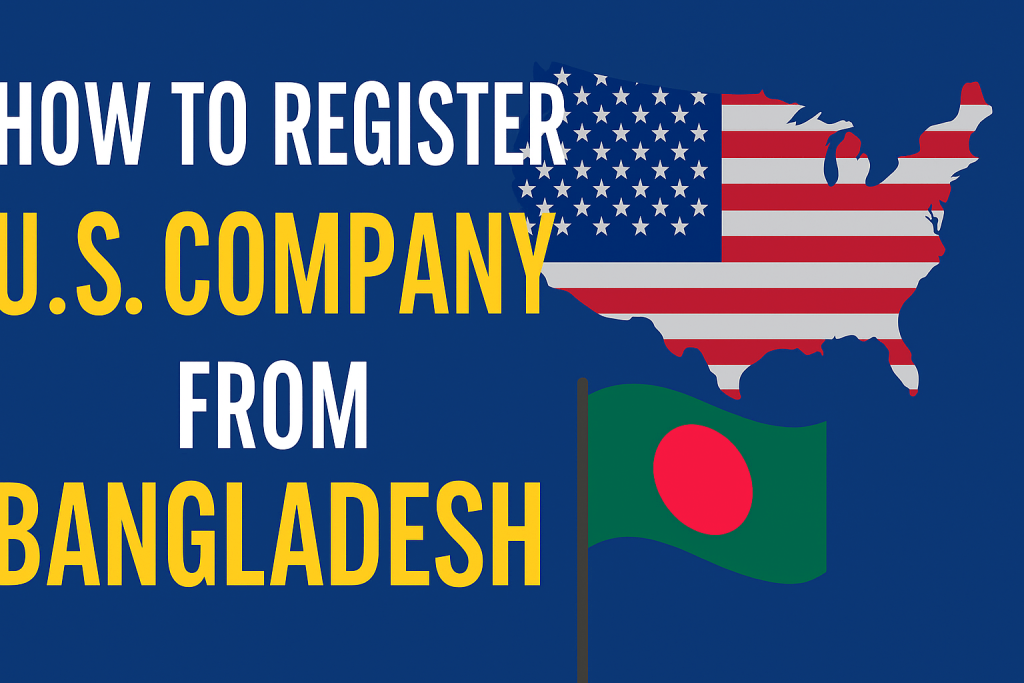
Did you know that over 5 million new businesses were registered in the U.S. in 2023 alone? That’s about 14,000 new companies every single day. Now here’s the kicker — you don’t even need to live in the United States to own one.
Imagine this: you’re sitting in Dhaka, sipping your cha, and your U.S. company is accepting payments from clients in New York, selling on Amazon in California, or pitching to investors in Silicon Valley. Sounds fancy, right? But here’s the truth — it’s not just for the big guys. Thousands of Bangladeshi freelancers, agency owners, and startup founders are already doing it.
But let me guess your pain points:
- You’re tired of hearing “PayPal not available in your country.”
- Clients keep asking, “Do you have a U.S. company or bank account?”
- You want to sell on Amazon or use Stripe, but the paperwork feels like rocket science.
I’ve been there myself, scratching my head and asking, “Is this even possible without flying to America?” Spoiler alert: it is possible — and much easier than most people think.
In this post, I’ll walk you step by step through how to register a U.S. company from Bangladesh, what it costs, what mistakes to avoid, and how to get everything — from your company papers to your bank account — sorted without leaving your home.
So, if you’ve been waiting for the perfect moment to go global, this is it. Let’s get into it.
Why Should a Bangladeshi Entrepreneur Register a U.S. Company?

The question isn’t “why” — it’s really “why not?”
Global Trust and Credibility
A U.S. company name on your invoices can make your Bangladeshi startup look instantly legit. Imagine two emails:
- “Hello, I’m from XYZ Solutions BD.”
- “Hello, I’m from XYZ Solutions LLC, Delaware, USA.”
Which one gets taken more seriously? You already know the answer.
Payment Gateways and Banking
Stripe, PayPal, Wise, Mercury Bank — all these require a U.S. company setup. Without one, you’re stuck using workarounds that look unprofessional or get flagged.
Selling on Amazon and Marketplaces
Want to run Amazon FBA or Walmart Marketplace? A U.S. LLC with EIN is a must-have. Many Bangladeshi sellers are already doing this successfully.
Tax Benefits
Depending on how you structure things, you may avoid double taxation. U.S. LLCs that are treated as “pass-through” entities can sometimes save money.
👉 Stat: According to IRS data, non-resident foreigners own over 500,000 active U.S. LLCs, and a good number of them are run by South Asian entrepreneurs.
Step 1: Pick Your Business Structure
You’ve got two main options:
LLC (Limited Liability Company)
- Best for freelancers, agencies, e-commerce sellers, SaaS founders.
- Easy to set up, fewer formalities, and flexible taxation.
- You get liability protection — your personal assets are safe if something goes wrong.
C-Corporation
- Best for startups raising money from U.S. investors.
- Most VCs and angel investors prefer Delaware C-Corps.
- More paperwork, but gives you stock options and investor credibility.
👉 My advice? Start with an LLC unless you’re already pitching to Silicon Valley investors.
Step 2: Choose the Right State
Not all states are created equal when it comes to forming a company.
Delaware
- Known as the “startup capital.”
- Big companies like Google and Facebook started here.
- Best if you want investor trust.
Wyoming
- Low annual fees.
- Privacy-friendly (your name can stay off public records).
- No state income tax.
New Mexico
- Affordable.
- Almost no compliance burden.
- Great if you’re just testing things out.
Florida / Texas
- Friendly for e-commerce sellers.
- Good if you want a presence outside the startup bubble.
👉 Quick story: A Bangladeshi Amazon seller I know chose Wyoming for low cost, while a Dhaka-based SaaS startup I worked with went for Delaware because they were planning VC fundraising. Both made the right call for their goals.
Step 3: Choose a Company Name

- Make it unique.
- Check availability on the state’s business registry.
- Grab the .com domain before someone else does.
Pro tip: Keep the name simple and short. Clients remember “BlueWave LLC” faster than “Innovative Synergistic Global Solutions LLC.”
Step 4: Get a Registered Agent
This is mandatory. Every U.S. company needs a U.S. address to receive government and legal documents.
- Services like ZenBusiness, Northwest, Firstbase, Doola offer this.
- Costs around $50–$150/year.
Think of the registered agent as your U.S. receptionist who never sleeps.
Step 5: File Company Formation Documents
For LLC → You file Articles of Organization.
For C-Corp → You file Articles of Incorporation.
- Fees vary by state (from $50 in New Mexico to $300+ in Delaware).
- Most services handle filing for you online.
Step 6: Get Your EIN (Tax ID)
An EIN (Employer Identification Number) is like the NID for your business. You’ll need it for:
- U.S. bank account
- Stripe / PayPal
- Taxes
You can apply directly to the IRS with Form SS-4.
Or pay a service ($100–$200) to handle it.
Fun fact: Many Bangladeshi founders fax their SS-4 form to the IRS from a coffee shop. Yep, fax still works in 2025.
Step 7: Open a U.S. Business Bank Account
This is the real game changer.
You don’t need to fly to New York with a suitcase full of documents anymore.
Options:
- Mercury Bank – Very popular among non-residents.
- Relay Financial – Great for team accounts.
- Payoneer – Easier if you’re just testing the waters.
👉 Story time: A friend of mine in Chattogram opened a Mercury account for his SaaS tool. He now gets payments from U.S. clients directly into that account — no messy international transfers.
Step 8: Set Up Payment Gateways
Once you have your LLC and EIN, you can apply for:
- Stripe – Perfect for SaaS, agencies, e-commerce.
- PayPal Business – For client payments.
- Wise Business – For cheaper international transfers.
This solves the PayPal-in-Bangladesh problem instantly.
Step 9: Keep Things Compliant
Don’t make the mistake of thinking registration is a one-time job.
You’ll need to:
- File annual reports (costs $50–$200 depending on state).
- Pay franchise taxes (especially Delaware).
- Renew your registered agent service.
Think of this like maintaining your driving license — not hard, but you can’t skip it.
Cost Breakdown
- State filing fee: $50–$300
- Registered agent: $50–$150/year
- EIN service: $100–$200 (if outsourced)
- Bank account: Usually free
- Annual compliance: $200–$500
👉 First-year total: $300–$700
👉 Yearly after that: $200–$500
Common Mistakes Bangladeshis Make
- Choosing Delaware just because “big companies do it” (even if they don’t need investors).
- Forgetting to apply for an EIN.
- Not filing annual reports (your company can get dissolved).
- Mixing personal and company money.
- Using personal PayPal instead of business accounts.
FAQs
1. Can I register a U.S. company without going there?
Yes. Everything can be done online with registered agent services.
2. Do I need a U.S. address?
No. The registered agent provides one.
3. Can I open a PayPal account with this?
Yes, once you have your LLC + EIN + U.S. bank account.
4. What’s the best state for Bangladeshis?
Wyoming for low cost, Delaware if you want investors.
5. How long does it take?
2–4 weeks on average. Some states process in a few days.
6. Do I need to pay U.S. taxes if I’m in Bangladesh?
It depends on your business activity. Many LLCs with no U.S. customers don’t pay federal tax, but rules vary. Talk to a tax pro.
7. Can I run Amazon FBA with this setup?
Yes. In fact, thousands of Amazon sellers from Bangladesh use U.S. LLCs.
Final Thoughts
Starting a U.S. company from Bangladesh isn’t a dream anymore — it’s a real option for freelancers, agencies, Amazon sellers, and startup founders.
Let’s recap:
- Pick your structure (LLC or C-Corp).
- Choose a state.
- Get a registered agent.
- File formation documents.
- Apply for EIN.
- Open a U.S. bank account.
- Set up payment gateways.
- Stay compliant.
That’s it. You’re officially global.

